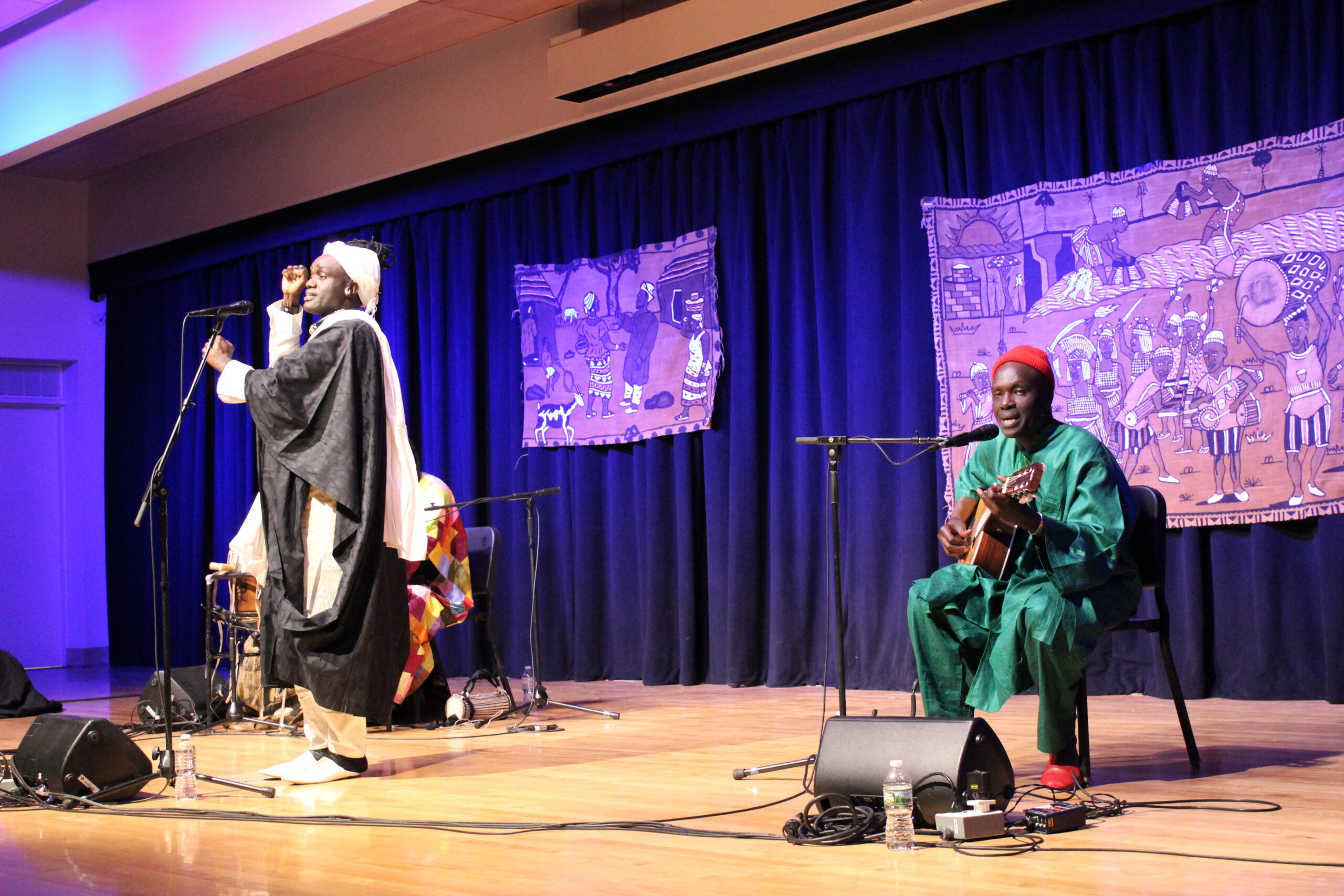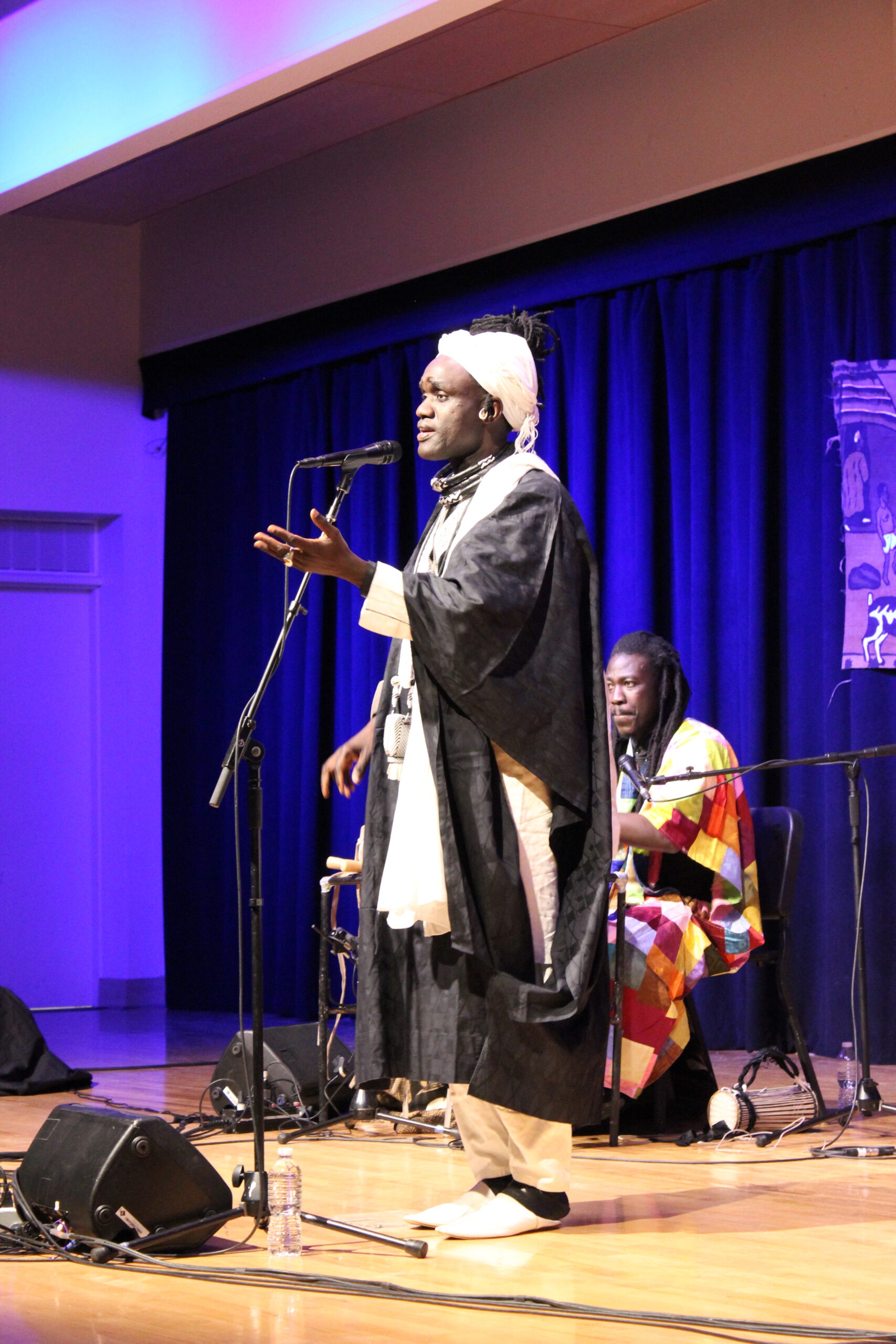‘Voyage without a Visa’ narrates immigration
March 1, 2019
 Kayla Snyder
Kayla SnyderOn Tuesday night, students and community members were taken on a journey in Kresge Auditorium with the performance of “Voyage sans Visa, Tukki saa suné (Voyage without a Visa),” which followed immigrants travelling from Senegal to France. The performance—showing in the United States for the first time ever—recounted the stories of people who left their homes for other lands, documenting their trials, happiness and hopes for the future.
The performance starred Boubacar Ndiaye, a celebrated storyteller, singer and dancer who seeks to promote the preservation and propagation of oral traditions. Ndiaye, who is originally from Senegal but currently living in France, was accompanied by Baye Cheikh Mbaye, a composer and traditional drums player from Senegal, and Pape N’diaye Paamath, a musician and guitarist who creates “Afro francophone” music.
The narrative recorded the harrowing journey of three immigrants on a boat from Senegal to France, and depicted families of the immigrants whose loved ones eventually returned, embracing the theme of longing to travel without constraints.
The performance proposes a greater outlook on immigration; the title, “Voyage without a Visa,” is inspired by the freedom of birds, who are able to leave home but ultimately come back to their nest. Ndiaye believes that if all frontiers were open, people would discover new places but ultimately return to their home to build something new.
“This idea that the world is belongs to all of us,” he said. “This dream of there not being any constraints to where we can travel and where we can go.”
Associate Professor and Chair of Romance Languages and Literatures Katherine Dauge-Roth worked to bring Ndiaye, Mbaye and Paamath to Bowdoin for their first ever appearance in the United States. Dauge-Roth was inspired by her course, “The Oral and the Written,” a survey of written and oral traditions across the francophone world from the Middle Ages to the abolition of slavery. She wanted her class to learn from a griot, a traditional West African storyteller, in order to break down traditional ways about studying literature.
“There’s a way in which Europe has valued the written over the oral, and oral traditions have gotten really lost,” said Dauge-Roth. “The whole course tries to sort of turn all that on its head and look at different oral traditions in addition to written traditions.”
Ndiaye’s storytelling relied heavily on the use of music. There were several moments when all three men’s music and voices would synchronize, emanating throughout the auditorium. Ndiaye’s movements and motions engaged with the music, as if the instrumentals were another component of his voice as the griot.
“Behind the tongue there is music, always, and behind every music there is a story,” said Ndiaye.
Although the entire performance was carried out in French and Wolof, a Niger-Congo language spoken in Senegal and Gambia, the power of storytelling moved the entire audience regardless of language.
“I think a lot gets communicated just through their very presence on stage,” Dauge-Roth said.
The audience was captivated by the performance, finishing Ndiaye’s sentences or questions, laughing in response to imbedded jokes and clapping with the tempo of the beat. At one point in the performance, Ndiaye prompted the audience to rise, clap and sing along, with a member of the audience even running on stage to dance with him.
“I was so thrilled tonight to see so many new Mainers in the audience and witness how much the show and the public acknowledgment of their cultural heritage meant to them,” said Dauge-Roth.
The event was sponsored by the Blythe Bikel Edwards Fund, the Africana Studies Program, and the Departments of History, Music and Romance Languages and Literatures.


Comments
Before submitting a comment, please review our comment policy. Some key points from the policy: